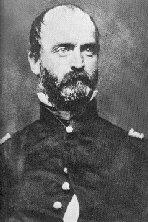

Probably no officer in the army was more spirited and none possessed a more martial family background than Brigadier General Lewis A. Armistead. He was somewhat above the average age of Lee's brigadier generals. But this appeared due to chance instead of any reluctance by superiors to trust him. In this army of extraordinarily able brigade commanders, Armistead, by his courage, experience, and good judgment, would have stood in nearly everyone's top group.
Armistead's family had left its name on some of the peaks of American history. His uncle, Major George Armistead, had commanded Fort McHenry and kept the flag flying in Baltimore harbor during the attack by the British fleet September 13-14, 1814, which inspired Francis Scott Key to write "The Star-Spangled Banner." His grandfather had served under Washington. His father, Captain Walter Keith Armistead, an army engineer who had graduated in the second class at West Point, had laid out the defenses of Norfolk, Virginia, in the War of 1812. The gallant defense of Norfolk and the American victory in beating off a formidable British expedition headed by Major General Sir Sidney Beckwith, June 1, 1813, had heartened the country at one of the most depressed moments of its history.
The Armistead family was from New Market, Virginia. Though Lewis was bom in New Bern, North Carolina, he entered West Point from Virginia, and would have been graduated in 1838 had he not been expelled in his junior year because he wielded a plate effectively against Jubal Early's head. Early's scalp was merely cracked and there would be no basis for any supposition that this might have permanently affected Early's military judgment; nor did it retard Armistead's career, for, despite his ejection, he went in the service with a commission. His father had become the army's chief engineer and a brevet brigadier general, and was closely associated in the Florida wars with blunt old Zachary Taylor under whom Lewis became a second lieutenant in the 6th Infantry in 1839.
Young Armistead showed unusual bravery in the Mexican War and won repeated citations and brevets. He was on garrison duty with his good friend Hancock at Los Angeles when war came in 1861, but when the decision had to be made, he crossed the continent and cast his fortunes with Virginia.
At Gettysburg on the afternoon of July 3rd, Armistead led his brigade in a supporting postion in an attack that would forever be known as Pickett's Charge.
The blue flanking column on the right had almost destroyed Kemper's brigade and now poured its fire into Garnett's and Armistead's men. These two brigades, tangled and confused, rushed the stone wall, clubbing muskets and jabbing with bayonets. None had time to load. At the front was Armistead. The Federal artillery fired its last round, the guns shotted to the muzzle, when the Virginia soldiers were but a few feet from them.
As strong runners seeing the goal ahead draw together their reserve powers for a burst of supreme effort and speed more swiftly across the finish line than at any point on the back course, so these daring soldiers, their objective just before them, impelled themselves to efforts which a few minutes earlier they would have judged beyond their powers, and pushed, clambered, jumped, and fell across the wall.
Armistead was in front of them. Just before they had begun this final dash he had walked along the line with final words of cheer. He had met on his left a mounted man, probably Garnett, who leaned from his horse that they might have a final word before making the rush together. Then "Old Lo" Armistead had plunged ahead, and Garnett had fallen. He put his black hat on his sword point and held it aloft for the whole brigade to see. When he was over the wall, about 150 of his men rushed pell-mell behind him.
Here, face to face, the general could see whom he was fighting. He called back, "It's the Philadelphia Brigade! Give them the cold steel, boys!!"
That was his last order. He put his hand possessively on the Federal cannon into which his men had charged, as though his thought was to turn it about, but at that instant, with his hat on his sword and his hand on a gun, he fell mortally wounded, fairly riddled with bullets. Some of them came from revolvers fired at arm's length.
An unidentified Federal colonel, who admired Armistead's courage and saw his peril, was at that very instant trying to ride into him and knock him down, to save him from the hail of bullets. The story that he pitifully sent word to Hancock that he had chosen the wrong side appears to be apochryphal. When Armistead fell the command of his brigade passed to Colonel William R. Aylett, grandson of Patrick Henry. Half of those who crossed the wall with Armistead were killed.
As Armistead was being carried back, Captain Harry Bingham of Hancock's staff met the bearers and asked if he could be of help. Armistead requested that Hancock send his spurs and watch to his relatives. This Hancock did. Old Lo's sword had been taken where he fell.
|